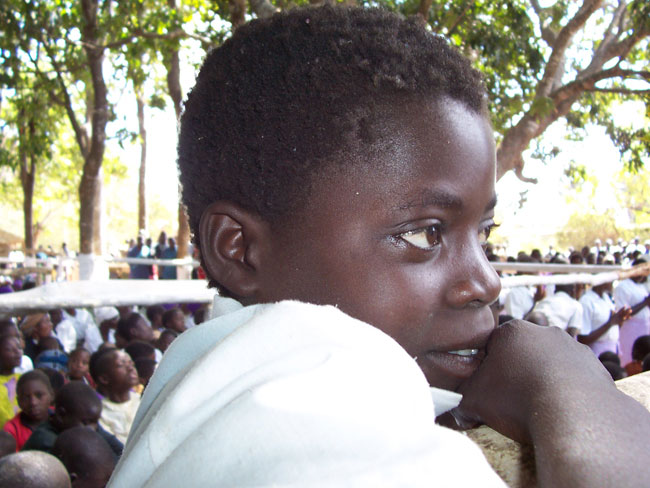Seventeen year old Fyness is awakened by the movement of the goat she shares her living quarters with. In the distance, the sound of Cockerels breaks the predawn silence. It is time for her to rise and set off for the maize garden.
She straps her 18-month-old baby on her back, picks up her hoe and steps out into the dark, quiet morning. There is already activity outside. Other villagers are either also on the way to their fields or off to collect water kilometres away at the only functioning borehole.Fyness is a fictional character but she illustrates the real-life dilemma of tens of thousands of girls across Malawi. Many are lured into marriage in their early teenage years. The fortunate ones who are still in school are required to carry out a list of household chores before they can set off for class.

Most chores around the house are the primary responsibility of girls. They cook, collect water and take care of the children. With men increasingly migrating to urban areas to seek employment, growing food is another role increasingly being taken up by women.
This naturally puts a lot of pressure on mothers to feed many mouths while their husbands struggle to find decent employment in town. Sometimes these men eventually remarry in town leaving their wives and children to suffer in the village. In cases like these, what do mothers with teenage daughters do? Marry them off. One less mouth to feed. One less person to clothe. And hopefully a new ‘son’ to help fix the grain silo, chop down firewood and dig a new pit latrine.
These young brides are now out of school. With their equally young and uneducated husbands, they enter the never-ending cycle of poverty. With almost no jobs in the village, their means of survival is subsistence farming. Using outdated farming practices with little or no fertilizers, they are fortunate if they harvest an ox cart full of maize when therains are good. They may also harvest some pumpkins and a bag of beans which are meant to last them the whole year.
Any ‘new’ clothes they wear are hand downs from their relatives in urban areas. Piece work on the neighbouring estate will earn them some Kwachas for soap and salt.
Uneducated and unempowered, this is their way of life.
Education empowers
Lack of education, especially among girls, has costly consequences. They are unable to make informed decisions regarding – among other issues – their reproductive health and child health. That is why a lot of health issues that arise are blamed on witchcraft and each day that they spend sick translates into lost productivity around the house and in their fields.
Lack of a proper education means that if they are lucky enough to get a job, it will be a menial one where they are likely to be financially exploited.
No role models
The girl child in most instances lacks a role model that they can relate to. All her aunties and cousins dropped out of school and married early. There is no one to encourage her. She is told that if she becomes too educated the young men in the village will feel intimidated to date her. The role models that drive out of town to events in rural areas are seen as just that, town folk on a day trip to flaunt their achievements.
The role of education
Normally schools in rural areas of the country are few and far apart. They lack teaching materials and sometimes teachers. And because the girl has to carry out household chores first, she normally arrives at school late. She has either missed out on classes or is barred from entering them all together on account of her late coming. After school, as soon as she gets back home she has work waiting for her. She rarely has time to study.
According to the 2015-2016 Malawi Demographic and Health Survey, more girls than boys are attending primary school. However only 23% of girls proceed to secondary school compared to a third of the boys. Post-secondary school, the number of girls who attend school drops to only 3%.
What is the fix?
Culture is one way. The thinking that education beyond primary school is not necessary for a girl is outdated and dangerous. Women play an extremely vital role in the community and being uneducated has serious ramifications to society.
Fixing the sometimes non-functioning education system is another way. Remunerating teachers and providing adequate learning materials is key. This help both boys and girls get a decent education. By educating both, you build a society where every member of society values the importance of attaining a level of quality education.
There are plenty other ways to ensure that the girl child’s right to education is guaranteed. If we do not priorities fixing these issues, the story of Fyness will be continuously repeated for decades to come.
Happy International Day of the Girl! #JusticeForGirls #GirlsSpkOut #IDG2017
This blog post was featured on the UNICEF Malawi blog
To receive a monthly roundup of stories from the #LifeUnbound blog and other gems subscribe below.
